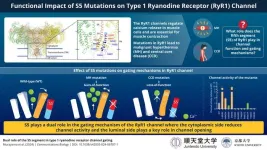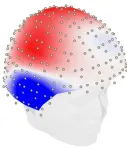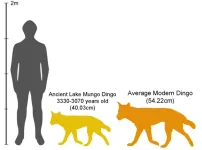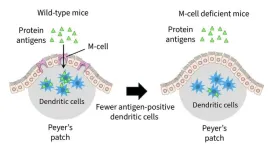(Press-News.org) About The Study: In this study, a higher burden of comorbidity was associated with worse clinical outcomes in people with multiple sclerosis (MS), although comorbidity could potentially be a partial mediator of other negative prognostic factors. The findings suggest a substantial adverse association of the comorbidities investigated with MS disease activity and that prevention and management of comorbidities should be a pressing concern in clinical practice.
Corresponding Author: To contact the corresponding author, Amber Salter, PhD, email amber.salter@utsouthwestern.edu.
To access the embargoed study: Visit our For The Media website at this link https://media.jamanetwork.com/
(doi:10.1001/jamaneurol.2024.2920)
Editor’s Note: Please see the article for additional information, including other authors, author contributions and affiliations, conflict of interest and financial disclosures, and funding and support.
# # #
Media advisory: This study is being presented at the European Committee for Treatment and Research in Multiple Sclerosis 2024 Annual Congress.
Embed this link to provide your readers free access to the full-text article This link will be live at the embargo time https://jamanetwork.com/journals/jamaneurology/fullarticle/10.1001/jamaneurol.2024.2920?guestAccessKey=197708bb-2594-4190-9cc1-fcd859428206&utm_source=For_The_Media&utm_medium=referral&utm_campaign=ftm_links&utm_content=tfl&utm_term=091824
END
Comorbidity and disease activity in multiple sclerosis
JAMA Neurology
2024-09-18
ELSE PRESS RELEASES FROM THIS DATE:
£18 million for DARE UK to support secure research on sensitive data
2024-09-18
London, United Kingdom, 18 September 2024 – UK Research and Innovation (UKRI), the UK’s largest public funder of research, has confirmed funding for a new phase of the DARE UK (Data and Analytics Research Environments UK) programme with up to £18.2 million made available over 2.5 years.
Starting this month, Phase 2 of the DARE UK programme will bring together Trusted Research Environments (TREs) across the UK to test and build new capabilities for a connected national network of secure data ...
New study unveils the impact of mutations in the calcium release channel on muscle diseases
2024-09-18
The type 1 ryanodine receptor (RyR1) is an important calcium release channel in skeletal muscles essential for muscle contraction. It mediates calcium release from the sarcoplasmic reticulum, a calcium-storing organelle in muscle cells, a process vital for muscle function. Mutations in the RyR1 gene can affect the channel's function in extremely contrasting ways leading to severe muscle diseases such as malignant hyperthermia (MH) and central core disease (CCD). MH is an inherited disease that causes high fever and muscle contractures in response to inhalational anesthetics in patients with gain-of-function RyR1 variants. CCD is one ...
Scientists quantify energetic costs of the migratory lifestyle in a free flying songbird
2024-09-18
Millions of birds migrate every year to escape winter, but spending time in a warmer climate does not save them energy, according to research by the Max Planck Institute of Animal Behavior (MPI-AB). Using miniaturized loggers implanted in wild blackbirds, scientists recorded detailed measurements of heart rate and body temperature from birds every 30 minutes from fall to the following spring—the first time the physiology of free flying birds has been quantified continuously at this scale over the entire wintering period. The data offer unprecedented insights into the true energetic costs of migrant and resident strategies and reveal a previously unknown mechanism used by migrants to ...
Understanding changes in pre-clinical Alzheimer’s disease
2024-09-18
Amyloid-beta and tau proteins have long been associated with Alzheimer’s disease. The pathological buildup of these proteins leads to cognitive decline in people with the disease. How it does that, though, remains poorly understood.
A new study from the labs of Sylvain Baillet at The Neuro and Sylvia Villeneuve at the Douglas Research Centre provides important insight into how these proteins impact brain activity and possibly contribute to cognitive decline.
The team led by Jonathan Gallego Rudolf, a Ph.D. candidate in Baillet and Villeneuve’s ...
Constriction junction, do you function?
2024-09-18
UPTON, N.Y. — Scientists from the U.S. Department of Energy’s (DOE) Brookhaven National Laboratory have shown that a type of qubit whose architecture is more amenable to mass production can perform comparably to qubits currently dominating the field. With a series of mathematical analyses, the scientists have provided a roadmap for simpler qubit fabrication that enables robust and reliable manufacturing of these quantum computer building blocks.
This research was conducted as part of the Co-design Center for ...
Early dingoes are related to dogs from New Guinea and East Asia
2024-09-18
New archaeological research by the University of Sydney has discovered for the first time clear links between fossils of the iconic Australian dingo, and dogs from East Asia and New Guinea.
The remarkable findings suggest that the dingo came from East Asia via Melanesia, and challenges previous claims that it derived from pariah dogs of India or Thailand.
Previous studies used traditional morphometric analysis – which looks at the size and shape of the animal using callipers – ...
$1 million grant to fund research of nerve regeneration in multiple sclerosis patients
2024-09-18
The National Multiple Sclerosis Society (USA) has awarded a grant of 1 million dollars to Dr. Isabel Pérez-Otaño, who leads the Plasticity and Remodeling of Neural Circuits laboratory at the Institute for Neurosciences (IN), a joint center of the Spanish National Research Council (CSIC) and the Miguel Hernández University (UMH) of Elche. The grant is part of the NMSS 'Pathways to Cure' program that funds innovative therapeutic approaches to treat multiple sclerosis (MS). The team will work on identifying mechanisms that mediate a special kind of brain plasticity, known as myelin plasticity. The goal is to find ways to stimulate myelin plasticity ...
New tool to assess equity in scholarly communication models
2024-09-18
[Strasbourg, 18th September 2024]
A new online tool designed to assess the equity of scholarly communication models is launched today at the OASPA 2024 conference. The “How Equitable Is It” tool, developed by a multi-stakeholder Working Group, comprising librarians, library consortia representatives, funders and publishers, and convened by cOAlition S, Jisc and PLOS, aims to provide a framework for evaluating scholarly communication models and arrangements on the axis of equity.
The tool, which was inspired by the “How Open Is It?” framework, is targeted at institutions, library consortia, ...
Research shows finger counting may help improve math skills in kindergarten
2024-09-18
Preschool teachers have different views on finger counting. Some teachers consider finger counting use in children to signal that they are struggling with math, while others associate its use as advanced numerical knowledge. In a new Child Development study, researchers at the University of Lausanne in Switzerland and Lea.fr, Editions Nathan in Paris, France, explored whether a finger counting strategy can help kindergarten-aged children solve arithmetic problems.
Adults rarely use their fingers to calculate a small sum (e.g., 3+2) as such behaviors could be attributed to pathological difficulties in mathematics or cognitive impairments. However, young children between ...
Proteins in meat, milk, and other foods suppress gut tumors
2024-09-18
Researchers led by Hiroshi Ohno at the RIKEN Center for Integrative medical sciences (IMS) in Japan have discovered that food antigens like milk proteins help keep tumors from growing in our guts, specifically the small intestines. Experiments revealed how these proteins trigger the intestinal immune system, allowing it to effectively stop the birth of new tumors. The study was published in the scientific journal Frontiers in Immunology on Sep. 18.
Food antigens get a lot of negative press because they are the source of allergic reactions to foods such as peanuts, shellfish, bread, eggs, and ...
LAST 30 PRESS RELEASES:
GLP-1 drugs associated with reduced need for emergency care for migraine
New knowledge on heritability paves the way for better treatment of people with chronic inflammatory bowel disease
Under the Lens: Microbiologists Nicola Holden and Gil Domingue weigh in on the raw milk debate
Science reveals why you can’t resist a snack – even when you’re full
Kidney cancer study finds belzutifan plus pembrolizumab post-surgery helps patients at high risk for relapse stay cancer-free longer
Alkali cation effects in electrochemical carbon dioxide reduction
Test platforms for charging wireless cars now fit on a bench
$3 million NIH grant funds national study of Medicare Advantage’s benefit expansion into social supports
Amplified Sciences achieves CAP accreditation for cutting-edge diagnostic lab
Fred Hutch announces 12 recipients of the annual Harold M. Weintraub Graduate Student Award
Native forest litter helps rebuild soil life in post-mining landscapes
Mountain soils in arid regions may emit more greenhouse gas as climate shifts, new study finds
Pairing biochar with other soil amendments could unlock stronger gains in soil health
Why do we get a skip in our step when we’re happy? Thank dopamine
UC Irvine scientists uncover cellular mechanism behind muscle repair
Platform to map living brain noninvasively takes next big step
Stress-testing the Cascadia Subduction Zone reveals variability that could impact how earthquakes spread
We may be underestimating the true carbon cost of northern wildfires
Blood test predicts which bladder cancer patients may safely skip surgery
Kennesaw State's Vijay Anand honored as National Academy of Inventors Senior Member
Recovery from whaling reveals the role of age in Humpback reproduction
Can the canny tick help prevent disease like MS and cancer?
Newcomer children show lower rates of emergency department use for non‑urgent conditions, study finds
Cognitive and neuropsychiatric function in former American football players
From trash to climate tech: rubber gloves find new life as carbon capturers materials
A step towards needed treatments for hantaviruses in new molecular map
Boys are more motivated, while girls are more compassionate?
Study identifies opposing roles for IL6 and IL6R in long-term mortality
AI accurately spots medical disorder from privacy-conscious hand images
Transient Pauli blocking for broadband ultrafast optical switching
[Press-News.org] Comorbidity and disease activity in multiple sclerosisJAMA Neurology






